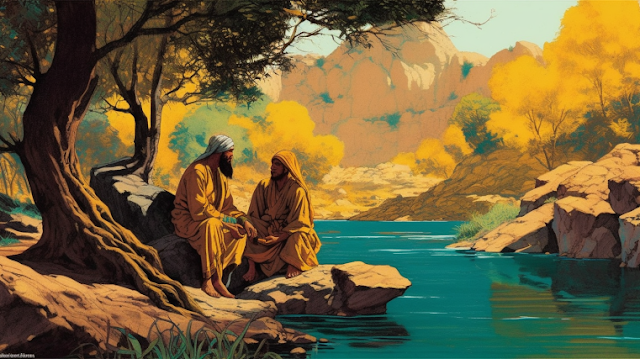The encounter between Musa (Moses) and Khidr in the Quran is one of Islamic tradition's most enigmatic and intriguing stories. It is a tale of two vastly different characters who meet by chance and embark on an unexpected journey together.
Musa, a prophet of God, seeks knowledge and guidance, while Khidr, a mysterious figure, possesses a wisdom that transcends human understanding. This encounter is rich with meaning and significance, offering valuable lessons for seekers of knowledge and insight.
In this article, we will delve into the story of Musa and Khidr, exploring its context and significance, the character of Khidr, the lessons learned from their interaction, interpretations and scholarly perspectives, and the story's relevance to contemporary society.
1. Introduction to Musa and Khadr's Encounter
Overview of the Story
The story of Musa and Khidr is a mysterious encounter from the Quran that tells of a journey taken by the prophet Musa (Moses) and a mysterious figure named Khidr. In the story, Musa is seeking knowledge from Allah and is directed to a man who possesses exceptional knowledge granted to him by God.Importance and Significance of the Story
The story of Musa and Khidr is significant because it teaches important lessons about the trust and humility required to truly gain knowledge and the ultimate wisdom of God's plans. The encounter is a reminder that even the most learned individuals can always learn more and that some secrets of the universe will always remain beyond human understanding.2. The Context and Significance of the Encounter
The Historical Context of the Story
The story of Musa and Khidr is set when Musa was the leader of the Israelites and was on a journey to gain knowledge through the help of Allah. The encounter occurs on a boat, where Khidr, who has been granted a unique ability by Allah, is found.The Significance of Musa and Khadr's Meeting
The meeting of Musa and Khidr is significant because it symbolizes the journey of spiritual enlightenment. Musa is seeking knowledge and guidance from Allah, and Khidr represents a figure who has already been granted this enlightenment through his close relationship with God.3. The Mysterious Character of Khidr
Who Is Khidr?
Khidr is an enigmatic character in the story of Musa and Khidr. He is described as having special knowledge granted to him by God, and he appears as a wise and mysterious figure who teaches Musa essential lessons about the nature of God's plans and the true meaning of humility.The Role of Khidr in the Quran
Khidr's role in the Quran is to symbolize spiritual enlightenment and teach believers that true wisdom and knowledge come from a deep relationship with God. Through his teachings and guidance, Khidr teaches the importance of trust and faith in God and reminds believers that there are secrets of the universe that only God can fully understand.4. The Lessons Learned from Musa and Khadr's Interaction
The Importance of Humility and Patience
One of the most critical lessons from the story of Musa and Khidr is the importance of humility and patience. Despite being a prophet, Musa humbly accepts that he has much to learn from Khidr and demonstrates excellent patience to truly understand the lessons that Khidr has to teach him.The Significance of Trusting in God's Plan
Another key lesson from the encounter between Musa and Khidr is the significance of trusting God's plan. Through his teachings, Khidr reminds Musa that there is a greater purpose and plan to the universe beyond human understanding and that true wisdom lies in trusting God's guidance.5. Interpretations and Scholarly Perspectives on the Encounter
Historical Interpretations of the Story
The story of Musa and Khidr in the Quran has fascinated scholars and readers for centuries. Different interpretations of the story have emerged at various times in history. Some scholars interpret the story as a narrative about a prophet encountering a wise and learned guide. Others interpret the story as a metaphor or allegory, with Musa representing the human soul and Khidr representing God's wisdom.Scholarly Perspectives on the Story
Many scholars see the story of Musa and Khidr as a lesson about the importance of humility and the limitations of human knowledge. Others see it as a story about the soul's spiritual journey, with Khidr representing the teacher who guides the seeker on the path to enlightenment. Some scholars also see the story as a parable about the tension between divine knowledge and human free will.6. The Implications of Musa and Khadr's Encounter on Contemporary Society
The Relevance of the Story Today
The story of Musa and Khidr is still relevant today because it speaks to the human experience of seeking knowledge and finding guidance. The report encourages us to be humble and open-minded in searching for knowledge and accept that we may only sometimes understand everything we encounter.The Importance of Seeking Knowledge in Today's World
In today's world, where information is readily available and easily accessible, the story of Musa and Khidr reminds us that true wisdom comes not from accumulating facts and figures but from seeking knowledge with an open heart and a willingness to learn.7. Conclusion: Musa and Khadr's Encounter as a Model for Seeking Knowledge in Islam
The Significance of Seeking Knowledge in Islam
In Islam, seeking knowledge is considered a sacred duty. The Quran and the Hadith are filled with verses and teachings that emphasize the importance of knowledge and the role of the teacher as a guide to the seeker. Musa and Khidr's story is a powerful reminder of the centrality of seeking knowledge in the Islamic tradition.How Musa and Khidr's Encounter Can Serve as a Model for Seeking Knowledge
The encounter between Musa and Khidr can serve as a model for seeking knowledge in Islam in several ways. First, it reminds us to approach the search for learning with a humble and open heart. Second, it encourages us to seek guidance from those who are wiser and more knowledgeable than ourselves.Frequently Asked Questions (FAQ)
What is the story of Musa and Khidr?
The story of Musa and Khidr is a tale from the Quran about Musa's encounter with a mysterious figure named Khidr. Together, they embark on a journey that leads Musa to learn valuable lessons about knowledge, wisdom, and faith.Who is Khidr?
Khidr is a mysterious figure in Islamic tradition who appears in the story of Musa and Khidr. He is often regarded as a prophet, saint, or angel with wisdom that transcends human understanding.What are the lessons learned from the story of Musa and Khidr?
The story of Musa and Khidr offers valuable lessons about the importance of seeking knowledge and wisdom, trusting in God's plan, and practicing humility and patience. These virtues are essential for knowledge seekers and those who wish to deepen their faith.Why is the story of Musa and Khidr significant in Islam?
The story of Musa and Khidr is significant in Islam because it offers guidance and inspiration for seekers of knowledge and wisdom. It highlights the importance of spiritual direction and the virtues of humility, patience, and trust in God. The story is also a reminder of the power and wisdom of God and the importance of surrendering to His will.
References & External Links
- "Chapter 18: Al-Kahf". Quran.com. Retrieved 2021-04-05.
- "Story of Khidr (AS) and Prophet Musa (AS)." IslamicFinder. Retrieved 2021-04-05.
- Abdel Haleem, M. A. S. (2008). The Qurʼan: A new translation. Oxford University Press.
- Tabatabaei, M. H. (1987). The Qur'an in Islam: Its Impact and Influence on the Life of Muslims. Zahra Publications.
- Mir, M. A. (2005). Articulating Reasons: An Introduction to Inferentialism. Open Court Publishing.

Comments
Post a Comment